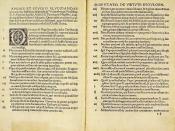The motives of Martin Luther in the German states and King Henry VIII in England could not have been much more dissimilar than they were. However, their actions of bringing about reform likened them. Martin Luther was motivated to reform the church solely for religious reasons; mostly frustration with the corruption of the Catholic Church, while King Henry VIII was motivated by both his personal life and his personal gain.
The whole idea to reform the church in England essentially started when King Henry VIII realized he would be unable to divorce his wife, Catherine. He had already set his sights on Anne Boleyn, so he needed to find a quick loophole in order to divorce Catherine and marry Anne. Because the Catholic Church still headed England and even the King had to submit to Papal rule, Henry decided it would be far better if he could just be sovereign (and therefore be able to divorce Catherine).
Due to this revelation, King Henry decided to reform the Catholic Church and create "The Church of England". Theologically, he stuck to Catholic principals such as confession and clerical celibacy, but he closed monasteries in order to acquire the wealth they held. In essence, all King Henry did was change the legality of the Church but he did not bring about revolutionary religious change.
Martin Luther, on the other hand, had no personal motives at hand when he decided he wanted to reform the church. Martin Luther had witnessed and quickly became frustrated with the corrupt acts of the church such as simony, nepotism, neglect of the celibacy rule, absenteeism, and pluralism. The final straw that sent Martin Luther over the edge was when Pope Leo X approved the sale of indulgences by Johan Tetzel in order to fund the building of St.


